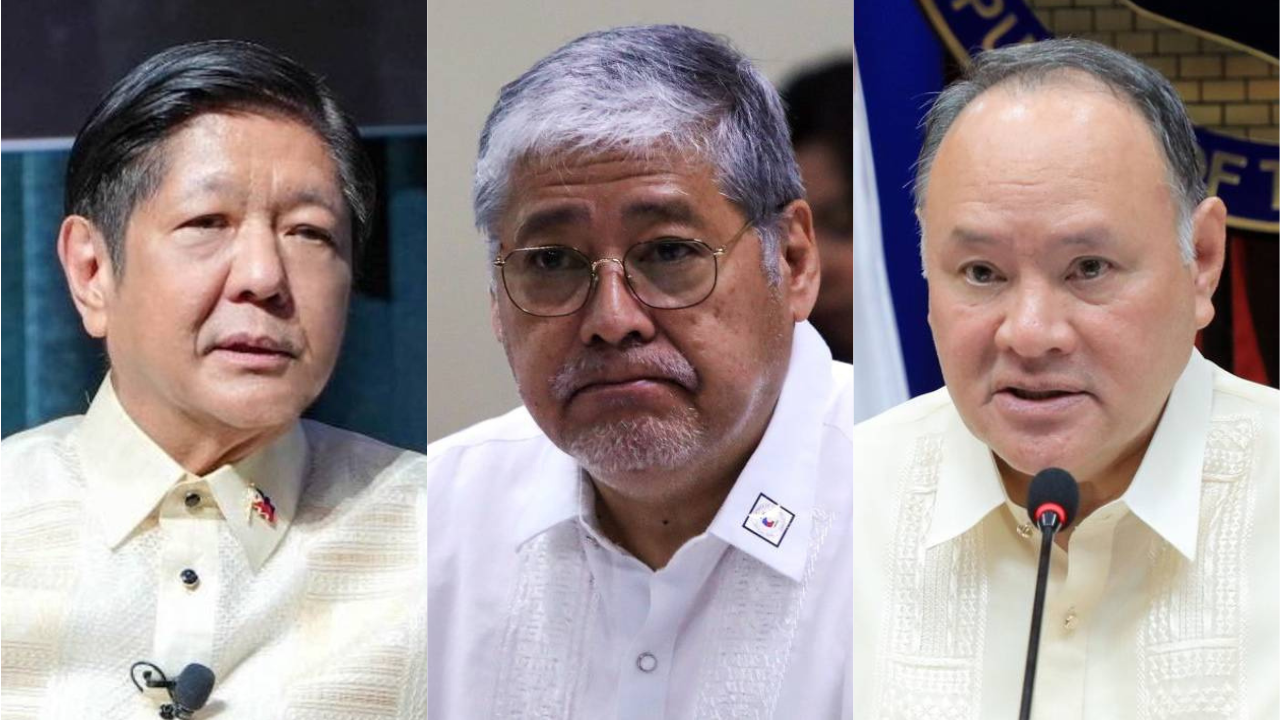DFA: China’s Coast Guard rules violate international law

FROM LEFT: President Ferdinand ‘Bongbong’ Marcos Jr., Foreign Sec. Enrique Manalo, and Defense Sec. Gilberto Teodoro Jr.—photo from Malacañang/Senate PRIB/DND Facebook page
MANILA, Philippines — The Philippines warned China that it would be “in direct violation of international law” if it orders its coast guard to detain for up to 60 days without trial supposed “trespassers” in the West Philippine Sea where the Philippines has jurisdiction.
The Department of Foreign Affairs (DFA) said China’s coast guard regulations, set to take effect on June 15, may not be applied in other states’ territories, maritime zones or jurisdictions and would “violate other sovereign states’ rights and entitlements under international law.”
READ: China Coast Guard: We can detain trespassers
Domestic laws “cannot be applied nor enforced in the high seas under international law,” added the DFA.
“China would be in direct violation of international law should it enforce these new regulations in the waters and maritime features within the illegal, null and void, and expansive 10-dash line, which would effectively cover areas of the West Philippine Sea where the Philippines has sovereignty, sovereign rights and jurisdiction, or in the high seas,” the DFA said in a statement on Sunday.
READ: Carpio: New China Coast Guard regulation contrary to Unclos, UN Charter
The DFA reminded China that its domestic laws should “abide by its commitments and obligations under international law,” particularly the 1982 United Nations Convention on the Law of the Sea, the binding 2016 Arbitral Award on the South China Sea, as well as the 2002 Declaration on the Conduct of Parties in the South China Sea.
“We reiterate our call for China to comply with international law and desist from any action that would undermine peace and security in the region,” the department said.
Detention
Under the new regulations announced on May 15, the Chinese coast guard was authorized to interrogate and detain for up to 30 days, and up to 60 days in some cases without trial, foreign vessels and persons suspected of crossing China-claimed waters.
Beijing issued the order as the Chinese coast guard has lately been aggressively blocking Philippine vessels at Bajo de Masinloc or Panatag (Scarborough) Shoal and at Ayungin (Second Thomas) Shoal, areas that lie within the Philippines’ 370-kilometer (200-nautical mile) exclusive economic zone (EEZ) in the West Philippine Sea.
China continues to claim most of the South China Sea, including the West Philippine Sea, despite the July 12, 2016, ruling by the Permanent Court of Arbitration that invalidated China’s sweeping claims and upheld the Philippines’ EEZ.
President Ferdinand Marcos Jr. has called China’s regulations “unacceptable” while Defense Secretary Gilberto Teodoro Jr. called it a “provocation and violation of the United Nations charter.”
Foreign Secretary Enrique Manalo said the illegal regulations affect not only the Philippines but “every country in the world, theoretically.”
Aside from the Philippines and China, other claimants to the South China Sea features are Brunei, Malaysia, Vietnam and Taiwan.
‘Advisory opinion’
The DFA again urged China to abide by the 2016 Arbitral Award on the South China Sea after the ruling was repeatedly cited by the International Tribunal on the Law of the Sea (Itlos) in its May 21 “advisory opinion” on the obligation of states to protect the marine environment from the impact of climate change.
“This bolsters and reinforces the legitimacy of the final and binding 2016 arbitration award, and its unassailable status as part of the corpus of international law,” the DFA said on Saturday.
“The Philippines therefore takes this opportunity to reiterate its continuing call for full compliance with the award,” it added.
The DFA said 26 states or groups of states also cited the arbitral award as a legal authority in their respective statements during the Itlos proceedings.
China, which has refused to recognize the arbitral ruling, participated in the proceedings along with the Philippines and several other nations.
In the first international judicial opinion on state obligations concerning climate change, the Itlos said states are under obligation to take all necessary measures to control maritime pollution from greenhouse gas emissions.
The tribunal also said states are under special obligation to protect and preserve the marine ecosystem from the impact of climate change.
For comprehensive coverage, in-depth analysis, visit our special page for West Philippine Sea updates. Stay informed with articles, videos, and expert opinions.
